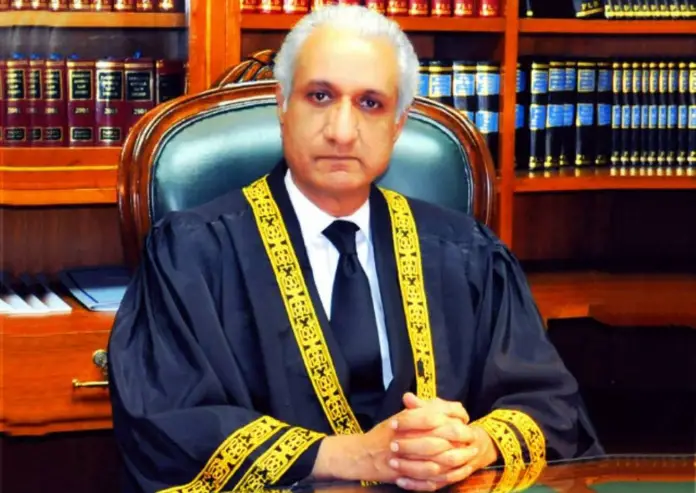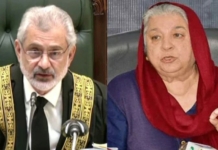Supreme Court judge Justice Ijazul Ahsan on Monday, during the hearing of a presidential reference seeking the top court’s opinion on the interpretation of Article 63-A, observed that “a few lawmakers switching loyalties to change a government at any time is a joke”.
A five-member larger bench headed by Chief Justice of Pakistan (CJP) Umar Ata Bandial, and comprising Justice Ahsan, Justice Mazhar Alam Khan Miankhel, Justice Munib Akhtar and Justice Jamal Khan Mandokhail, is hearing the reference, submitted by the Attorney General of Pakistan (AGP) Khalid Jawed Khan on March 21.
During the hearing, the chief justice observed that even if a member was de-seated and the no-confidence motion against the prime minister was unsuccessful, the ruling party “still loses the majority”. The AGP replied that there was a separate procedure if that was the case.
Justice Akhtar observed that the article related to lifetime disqualification was applicable when a member hid information in his nomination papers, questioning how a lawmaker could be disqualified for life without misconduct proceedings being initiated against him.
Earlier, the AGP referred to a Supreme Court verdict from 2018 in which the SC had asked all candidates to submit an affidavit along with nomination papers, despite the fact that there was no requirement of an affidavit in the law, and added that it was submitted on the orders of the court.
Justice Mandokhail asked the AGP whether he believed there was something “missing” in Article 63-A, to which he replied that the article in question could not be read alone.
The chief justice observed that the Supreme Court’s 2018 verdict, earlier mentioned by the AGP, talked about the credibility and sanctity of the elections.
“A five-member Supreme Court bench had referred to Articles 62 and 63 to maintain transparency,” the AGP said, reiterating that members of political parties were bound by party discipline.
At this, Justice Ahsan observed that Article 63-A was related to de-seating, and wondered how it could be linked with lifetime disqualification. Different forums were available to take action against those who changed loyalties, he noted, observing that linking Article 63-A to lifetime disqualification was “merely a hypothesis”.
For his part, the AGP argued that the lifetime disqualification clause was applicable where mala fide intention was involved. Justice Ahsan remarked that the question was what dishonesty was committed and against whom.
Justice Mandokhail questioned whether there was a punishment for resigning, to which the AGP responded that the “problem was no one was resigning”. “Is de-seating under Article 63-A not enough?” the judge asked.
The CJP remarked that members “will have to face the consequences of violating the party policy”. He observed that Article 63-A states that the parliamentary membership of the MNA will be terminated.
“You want to determine the period of disqualification,” Justice Bandial said. Disqualification under Article 62 (i)(f) required a verdict, he observed, questioning whether an MNA could be disqualified for up to five years under Article 63-A.
Justice Ahsan, however, asked how Articles 63-A and 62 (i)(f) could be linked. “Isn’t it necessary to prove taking bribes on a forum?” he inquired and then observed that Article 62 (i)(f) was applicable on taking bribes.
The chief justice asked the AGP whether a lawmaker could be disqualified for three years or five years under Article 63-A or if it was temporary. “Are you seeking lifetime disqualification for political dishonesty?”
Meanwhile, Justice Akhtar observed that both the constitutional provision of lifetime disqualification and Article 63 were different.
He remarked that lifetime disqualification was related to false information and statements in nomination papers. “Action against a dissident member is a matter for after the election,” he said. The Election Commission of Pakistan (ECP) was present to take action against a dissident member, Justice Mandokhail noted, adding that the ECP should be allowed to decide the matter once the party’s head submitted a declaration.
Meanwhile, the Sindh advocate general said that the position of the Sindh government was not included in the first information report (FIR) of the attack on Sindh House in Islamabad. On this, the CJP said that the court had an extraordinary hearing on the Sindh House incident. He advised the AG to contact the relevant forum.







